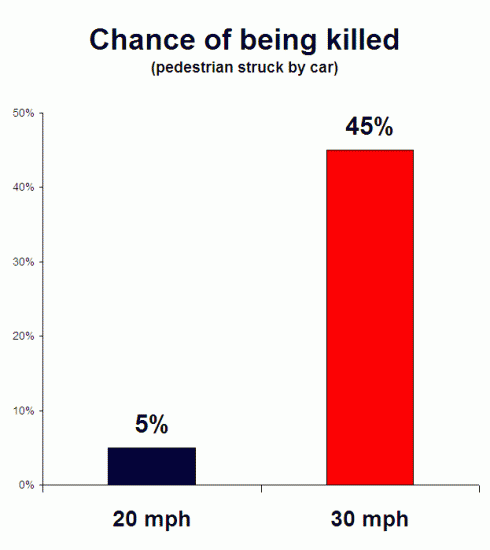Yesterday in Seattle, a 73-year-old woman was mowed down in a crosswalk. Yet today the resident crowd that’s fond of saying there’s a “war on cars” is screaming about a modest proposal before the Washington legislature: to allow cities to reduce speed limits to 20 mph on side streets without first conducting expensive engineering studies.
Last year, the bill passed the state House unanimously. I repeat, it passed unanimously: Not a single member of either caucus voted “no.” (It then stalled in a Senate committee.) As the vote suggests, allowing local control of speed limits is common sense public policy with no partisan bias.
In simple terms, here’s why speed limits matter: high speeds kill.
Between 2000 and 2009, 683 people were killed by cars while walking in Washington. Local control over residential speed limits would not have saved all of those people, but it might have saved some.
Yet here’s local loudmouth Dori Monson today:
[Mayor] McGinn’s hatred of cars and drivers is bordering on pathological… I do know that he is doing everything possible to make Seattle one of the most car-unfriendly cities in the country.
Apparently, according to Monson, letting cities set their own speed limits on residential streets amounts to a “pathological” hatred of cars. That will come as interesting news, no doubt, to those notorious car-haters in Idaho, where cities are given much more latitude than Washington is considering. Meanwhile, British Columbia lets cities drop speed limits all the way to 12 mph. And last year, Oregon passed a law similar to Washington’s proposal with overwhelming bipartisan support.
Ken Schram apparently groused about the measure this morning. And even the King 5 News report insists on framing up the bill as a bikes-versus-cars issue, which it most decidedly is not.
For the record, there’s nothing partisan—much less “pathological”—about reducing red tape for cities that want to reduce traffic speeds to protect their citizens, especially when it’s children and the elderly who are disproportionately killed by speeding cars.
So here’s my own modest proposal: instead of ranting like lunatics about an imaginary “war on cars,” maybe Washington’s commentator class could spend some time with this interactive map of pedestrian fatalities in the state. And then study the city and county statistics. And then read Alan’s thorough and judicious case for why local speed limit-setting is a good idea.
And then… take a deep breath. Allowing cities to set 20 mph speed limits on residential streets probably doesn’t mean there’s a war on cars.



Comments are closed.